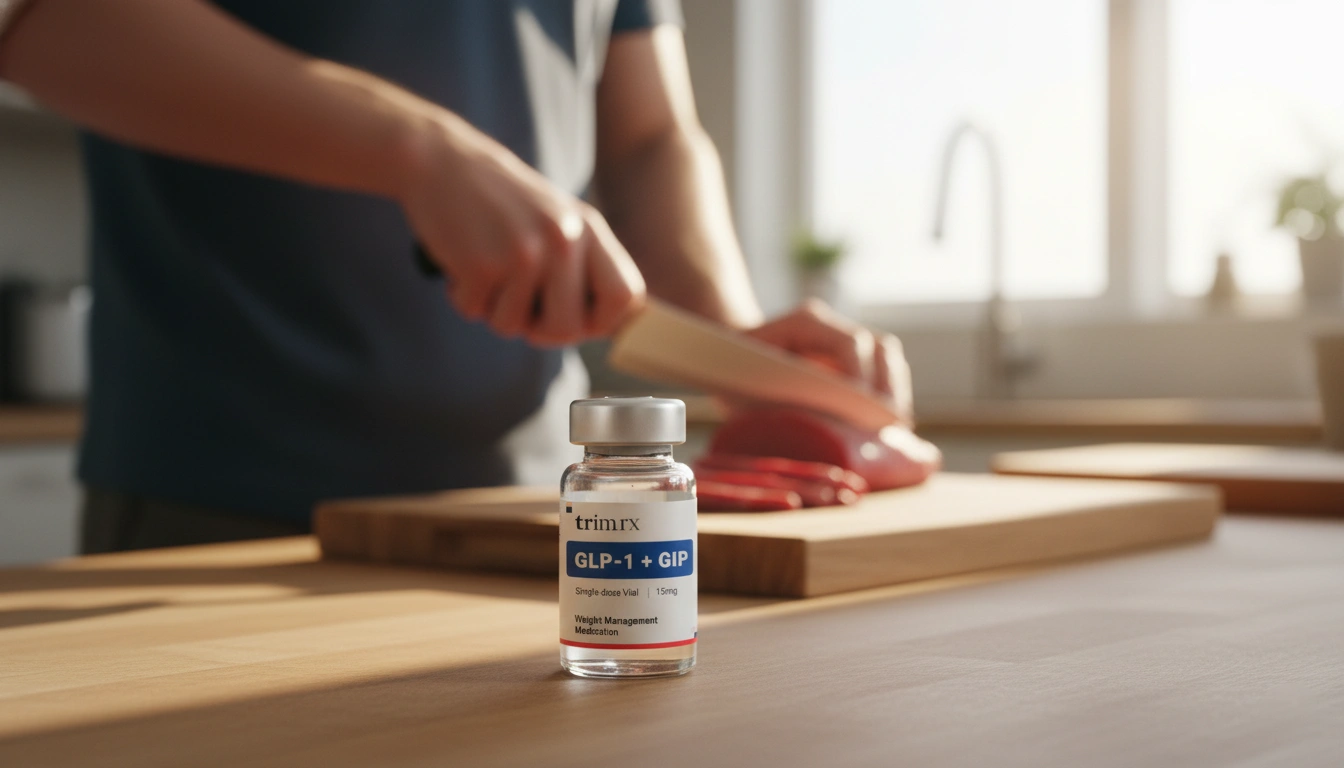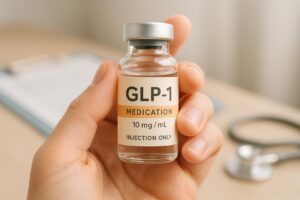Why Am I Not Losing Weight on GLP-1: Understanding the Factors at Play

Introduction
Have you recently embarked on a weight loss journey armed with GLP-1 medications like Semaglutide or Tirzepatide, only to find the scale stubbornly unmoved? You’re not alone. Many individuals share the same frustration, even after committing to lifestyle changes and adhering to their medication regimen. In fact, studies indicate that while a significant percentage of users experience weight loss, a notable fraction does not achieve their desired results. This scenario raises a critical question: Why am I not losing weight on GLP-1?
Understanding the complexities of weight loss, especially when aided by medications, is essential for anyone navigating this path. In this blog post, we will delve into the various reasons why some individuals may not see the expected results from GLP-1 medications. We aim to provide insights that empower you to make informed decisions about your weight loss journey, encouraging a holistic approach that combines medication, lifestyle changes, and personalized care.
Throughout this post, we will explore factors such as medication adherence, dosage issues, lifestyle habits, and underlying health conditions. Our discussion will not only highlight common pitfalls but also offer actionable strategies to enhance your weight loss efforts. Ultimately, our goal is to ensure that you feel supported and informed as you navigate your weight loss journey with TrimRx, where we prioritize personalized, compassionate care in your quest for a healthier lifestyle.
Understanding GLP-1 Medications
Before we dive into the reasons behind potential weight loss challenges, it’s essential to understand how GLP-1 medications work. GLP-1, or glucagon-like peptide-1, is a hormone that plays a vital role in regulating appetite and glucose metabolism. Medications like Semaglutide (Ozempic and Wegovy) and Tirzepatide (Mounjaro and Zepbound) mimic this hormone, helping individuals feel fuller for longer by slowing gastric emptying and reducing hunger. These medications are designed to be part of a comprehensive weight loss strategy that includes dietary changes and increased physical activity.
How GLP-1 Medications Promote Weight Loss
- Appetite Regulation: GLP-1 medications signal the brain to reduce appetite, helping individuals consume fewer calories.
- Glycemic Control: They assist in stabilizing blood sugar levels, which can be particularly beneficial for those with diabetes or insulin resistance.
- Weight Loss Maintenance: Over time, these medications can lead to sustained weight loss, especially when used in conjunction with lifestyle modifications.
Despite their effectiveness, some individuals may experience challenges in achieving their weight loss goals while on GLP-1 treatment. Let’s explore the potential reasons behind this phenomenon.
Common Reasons for Lack of Weight Loss on GLP-1
1. Inconsistent Medication Adherence
One of the most significant factors affecting weight loss with GLP-1 medications is adherence to the prescribed regimen. Missing doses, taking the medication at irregular intervals, or not following the doctor’s instructions can hinder the medication’s effectiveness.
- Actionable Tip: Create a medication schedule and set reminders to ensure consistency. Discuss with your healthcare provider any challenges you face in adhering to the regimen.
2. Insufficient Dosage
GLP-1 medications often start at a low dose to minimize side effects, gradually increasing based on tolerance and effectiveness. For some individuals, the initial dosage may not be sufficient to achieve the desired weight loss.
- Actionable Tip: Regularly check in with your healthcare provider to assess whether a dosage adjustment is necessary. Studies show that higher doses often lead to greater weight loss outcomes.
3. Lifestyle Modifications
While GLP-1 medications can aid in weight loss, they are most effective when combined with lifestyle changes. Neglecting dietary adjustments or not engaging in regular physical activity can significantly impact your results.
- Actionable Tip: Consider taking our free assessment quiz to receive a personalized weight loss plan that includes dietary and exercise recommendations tailored to your needs. Take the Quiz Here.
4. Pre-existing Medical Conditions
Certain medical conditions, such as hypothyroidism, polycystic ovary syndrome (PCOS), and metabolic disorders, can impede weight loss efforts. For individuals with type 2 diabetes, weight loss may be slower due to the underlying condition.
- Actionable Tip: Discuss any medical issues with your healthcare provider. They may recommend additional evaluations or treatments that address these underlying conditions, enhancing your weight loss journey.
5. Psychological Factors: Stress and Emotional Eating
Stress can play a significant role in weight management. Elevated cortisol levels due to chronic stress may lead to increased appetite and cravings for unhealthy foods.
- Actionable Tip: Incorporate stress management techniques into your routine, such as mindfulness, yoga, or therapy. Addressing emotional eating patterns can also improve your overall relationship with food.
6. Dietary Choices
The effectiveness of GLP-1 medications can be compromised by poor dietary choices. Consuming high-calorie, nutrient-poor foods can negate the benefits of medication and hinder weight loss.
- Actionable Tip: Focus on a balanced diet rich in whole foods, fruits, vegetables, lean proteins, and healthy fats. Consider our GLP-1 Daily Support supplement to enhance your nutritional intake during your weight loss journey. Explore GLP-1 Daily Support.
7. Physical Inactivity
Exercise is a crucial component of any weight loss strategy. Regular physical activity not only aids in burning calories but also supports overall metabolic health.
- Actionable Tip: Aim for at least 150 minutes of moderate-intensity aerobic exercise per week. Incorporate strength training exercises to build muscle mass, which can enhance metabolism and support weight loss.
8. Plateaus
Experiencing a weight loss plateau is common and can occur even with diligent adherence to medication and lifestyle changes. The body often adapts to weight loss efforts, leading to temporary stalls in progress.
- Actionable Tip: If you hit a plateau, consider re-evaluating your eating habits and exercise routine. Small adjustments can reignite your weight loss journey.
9. Side Effects of Medications
Some individuals may experience gastrointestinal side effects from GLP-1 medications, such as nausea or constipation, which can impact their willingness to continue treatment or their overall calorie intake.
- Actionable Tip: Discuss any side effects with your healthcare provider. They can help you manage these issues and suggest alternative solutions if necessary.
10. Medication Interactions
If you are taking other medications, they may interact with GLP-1 therapies, potentially affecting weight loss. Certain medications can promote weight gain or may hinder the efficacy of GLP-1 medications.
- Actionable Tip: Always inform your healthcare provider about other medications you are taking. They can help you explore alternatives that do not interfere with your weight loss efforts.
Strategies for Maximizing Weight Loss on GLP-1 Medications
Embrace a Holistic Approach
While GLP-1 medications can significantly aid weight loss, it’s essential to adopt a holistic approach. This means combining medication with effective lifestyle changes, including:
- Dietary Adjustments: Focus on whole, nutrient-dense foods while monitoring portion sizes.
- Regular Exercise: Incorporate both aerobic and strength training activities into your routine.
- Mindfulness Practices: Engage in stress-reducing activities to improve emotional well-being.
Seek Support
Navigating a weight loss journey can be challenging, and you don’t have to do it alone. Seeking support from healthcare professionals, dietitians, or support groups can provide motivation and accountability.
- Actionable Tip: Consider joining a weight loss support group or working with a dietitian for personalized guidance.
Regular Check-ins with Healthcare Providers
Establishing a routine of regular check-ins with your healthcare provider can be invaluable. These appointments allow for ongoing assessment of your progress, medication effectiveness, and potential adjustments.
- Actionable Tip: Schedule follow-ups to discuss your weight loss journey and any challenges you face.
Conclusion
If you find yourself asking, “Why am I not losing weight on GLP-1?”, it is crucial to remember that weight loss is a multifaceted process influenced by various factors. By understanding the potential challenges and adopting a comprehensive approach that includes medication adherence, lifestyle modifications, and regular support, you can enhance your chances of success.
At TrimRx, we are dedicated to providing personalized weight loss solutions that prioritize your unique journey. If you’re ready to take the next step in your weight loss journey, consider taking our free assessment quiz to determine your eligibility for our prescription weight loss medications. Take the Quiz Here.
FAQ
Can GLP-1 medications cause weight gain?
No, GLP-1 medications are primarily associated with weight loss. However, some individuals may experience temporary bloating during the initial weeks of treatment.
How long does it take to see results from GLP-1 medications?
Many individuals begin to see weight loss within the first few weeks of treatment, though it may take several months to achieve optimal results.
What should I do if I hit a weight loss plateau?
If you encounter a plateau, consider reassessing your diet and exercise plan. Small adjustments can often reignite progress. Consult with your healthcare provider for tailored advice.
Are there alternatives to GLP-1 medications?
Yes, if GLP-1 medications are not providing the desired results, your healthcare provider may recommend alternative weight loss strategies or medications tailored to your needs.
How can I maximize my weight loss on GLP-1 medications?
Combine medication with a balanced diet, regular exercise, stress management techniques, and ongoing support from healthcare professionals.

Transforming Lives, One Step at a Time
Keep reading
Tracking Progress With GLP-1: What To Measure
Learn which metrics to track on GLP‑1 therapy—weight, waist, blood sugar, lipids, side effects, and non‑scale wins—and how often to monitor them.
Fatigue Solutions for Ozempic and Wegovy Users
Hydration, protein-rich meals, light activity, and better sleep can reduce medication-related fatigue and help maintain energy during weight-loss treatment.
GLP-1 Medication Side Effect Checker
Worried about GLP-1 medication side effects? Use our free checker for Semaglutide, Liraglutide, and more to learn what to expect and stay informed!



